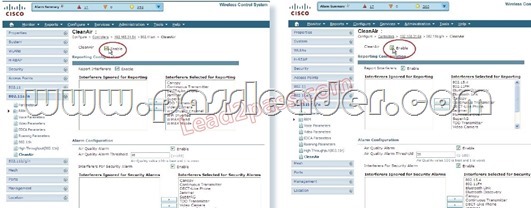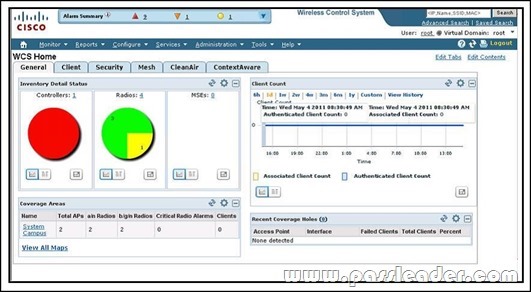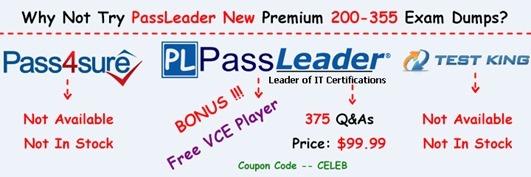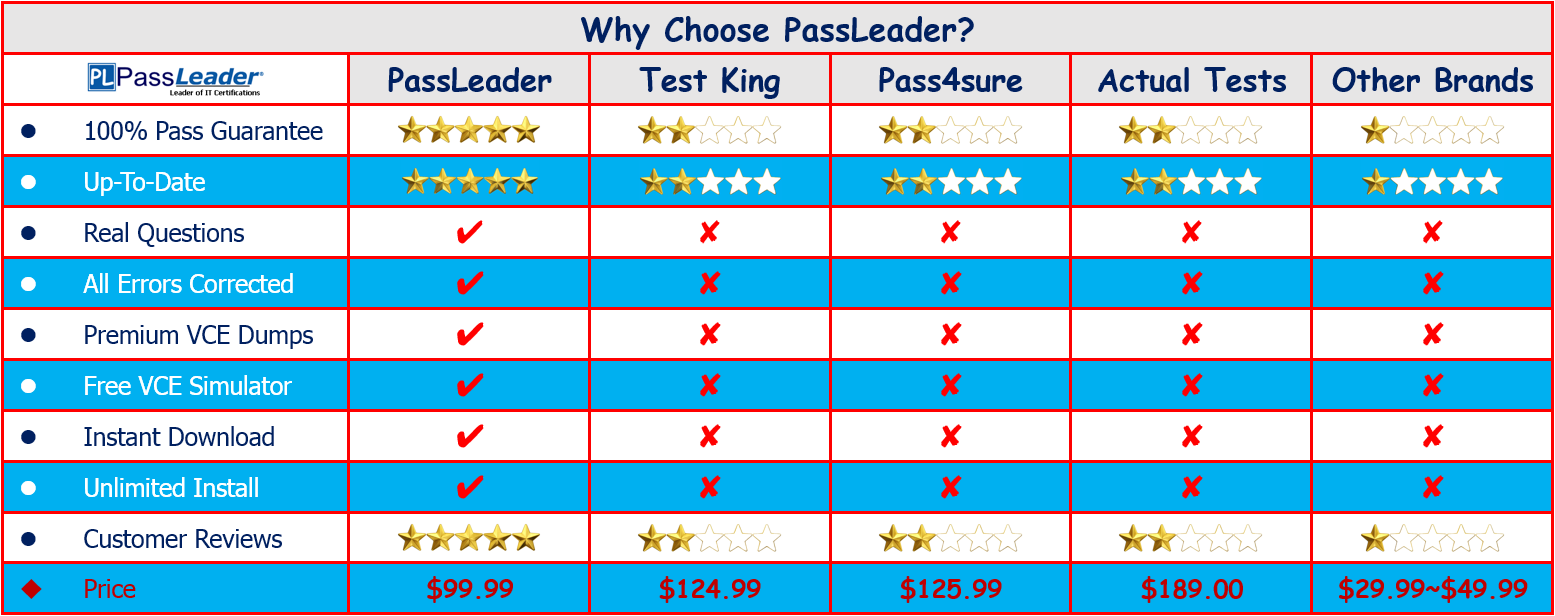Pass 200-355 exam with premium 200-355 exam dumps! PassLeader are offering the newest 375q 200-355 vce dumps and 200-355 pdf dumps including all the new added 200-355 exam questions, which are 100% valid for passing the 200-355 exam. PassLeader provide PDF and VCE format exam 200-355 briandumps with free version VCE player! Visit passleader.com now and download the 100% passing guarantee 375q 200-355 vce and pdf dumps to achieve 200-355 certification today!
keywords: 200-355 exam,375q 200-355 exam dumps,375q 200-355 exam questions,200-355 pdf dumps,200-355 practice test,200-355 vce dumps,200-355 study guide,200-355 braindumps,Implementing Cisco Wireless Network Fundamentals Exam
QUESTION 81
Refer to the exhibit. Which two menus do you click to determine the reachability status of a controller from Cisco WCS? (Choose two.)
A. Monitor
B. Reports
C. Configure
D. Services
E. Administration
F. Tools
Answer: AC
Explanation:
Monitor Menu. The Monitor menu provides you with a top-level description of the devices on your network. You can monitor your network, maps, Google Earth maps, various devices (controllers, access points, clients, tags, chokepoints, Wi-Fi TDOA receivers), RRM, alarms, and events.
Configure Menu. The Configure menu enables you to configure templates, controllers, access points, Ethernet switches, chokepoints, Wi-Fi TDOA receivers, config groups, auto provisioning, scheduled configuration tasks, profiles, ACS view servers, and TFTP servers on your network.
QUESTION 82
When using Cisco WCS version 7.0, which two features are available for the client troubleshooting tool when a Cisco Compatible Extensions v5 wireless client gets connected? (Choose two.)
A. Request CleanAir reports from the client
B. Send text messages to the client
C. Aggregated Cisco ACS authentication client information
D. Request the client to ping the DHCP-supplied IP gateway
E. Display asummary of client event history
Answer: BD
QUESTION 83
Which modulation technique allows you to achieve a data rate of 54Mb/s in the 2.4GHz-band?
A. Complimentary Code Keying
B. Differential Binary Phase Shift Keying
C. Differential Quadrature Phase Shift Keying
D. Quadrature Amplitude Modulation
Answer: D
QUESTION 84
Which limitation applies to the use of the Cisco WLAN Solution Management over Wireless feature?
A. Controllers must be managed using only secure protocols (that is, SSH and HTTPS), not nonsecure protocols (that is, HTTP and Telnet).
B. Read-write access is not available; only read-only access is supported.
C. Uploads and downloads from the controller are not allowed.
D. Wireless clients can manage other controllers however not the same controller and AP to which the client is associated.
Answer: C
QUESTION 85
Refer to the exhibit. A wireless network that consists of Cisco Aironet 1260 APs and Cisco 2100 Series WLC has been correctly configured with Cisco WCS version 7, which is also used for management. The CleanAir Zone of Impact is not visible for the respective Cisco WCS maps. Which two issues are causing the problem? (Choose two.)
A. software version
B. AP
C. Cisco WLC
D. Cisco MSE
E. Cisco WCS
F. Cisco WCS is not enabled.
Answer: BD
QUESTION 86
The results of a Cisco WCS client troubleshooting tool are summarized into a simple visual representation of a four-part progression of the connection status for a wireless client. What are the four parts? (Choose four.)
A. client MAC address
B. 802.11 authentication
C. IP address assignment
D. 802.11 association
E. successful association
F. authentication method
G. SSID
H. client radio type
Answer: BCDE
Explanation:
Please refer to this link for more information about the topic.
http://www.cisco.com/c/en/us/support/docs/wireless/4400-series-wireless-lan-controllers/107585-client-con.html
QUESTION 87
Refer to the exhibit. Which action allows you to view a summary count by alarm types for the displayed total of 11 alarms?
A. Choose Monitor > Alarms
B. Click the Security tab
C. Click a respective number in the Alarm Summary
D. Click the Alarm Summary blue arrow
E. Choose Home (house icon) > Alarm Summary
Answer: D
QUESTION 88
Which two statements about the Cisco WLC and AP code upgrade when 7.0 is running are true? (Choose two.)
A. The AP can download and run new code only after a Cisco WLC reboot causes the AP discovery and join.
B. The AP can download new code before the Cisco WLC reboot, but only if the AP is configured the CLI via SSH.
C. The AP can download new code before Cisco WLC reboot if it is configuring the Cisco WLC directly using the GUI via HTTP or HTTPS.
D. The Cisco WLC defaults to booting newer code, but it can boot older backup code only from the CLI configuration.
E. The Cisco WLC can boot either primary or back code configured from the GUI.
F. The Cisco WLC can download only a single code at a time for reboot.
Answer: CE
Explanation:
Each Cisco WLC can boot off the primary, last-loaded OS image or boot off the backup, earlier-loaded OS image. In order to change a Cisco WLC boot option, issue the config boot command. By default, the primary image on the controller will be chosen as the active image.
Examples
> config boot primary
> config boot backup
In order to configure the boot order using the WLC GUI, complete these steps: when the WLC reboots and comes back up, it will boot with the backup image.
http://www.cisco.com/c/en/us/support/docs/wireless/4400-series-wireless-lan-controllers/107530-backup-image-wlc.html
QUESTION 89
You are on the phone working with a colleague that is console connected to a lightweight AP that has lost its configuration. Which three actions are neecessary to allow the AP to connect to a controller? (Choose three.)
A. Configure the AP IP address.
B. Configure the controller name.
C. Configure the controller IP address.
D. Configure the AP hostname.
E. Configure the AP IP default-gateway.
F. Configure the AP username and password.
Answer: ACE
Explanation:
In order to manually configure static information on a LAP using the AP CLI interface, you can use these EXEC mode CLI commands:
AP#capwap ap ip address <IP address> <subnet mask>
AP#capwap ap ip default-gateway <IP-address>
AP#capwap ap controller ip address <IP-address>
AP#capwap ap hostname <name>
(optional)
Notice the first 3 are needed for the AP to connect to the controller; the last step is optional and not needed for basic connectivity to the controller.
http://www.cisco.com/c/en/us/support/docs/wireless/aironet-1200-series/99763-reset-lwappconfig-lap.html
QUESTION 90
You have a lightweight AP that has been moved to a new subnet and has become stranded because DNS and DHCP servers are unavailable. The AP cannot connect to the controller. When connected to the console port, which three minimum parameters must you configure? (Choose three.)
A. AP IP address
B. controller name
C. AP hostname
D. default gateway IP address
E. controller IP address
F. username and password
Answer: ADE
Explanation:
In order to manually configure static information on a LAP using the AP CLI interface, you can use these EXEC mode CLI commands:
AP#capwap ap ip address <IP address> <subnet mask>
AP#capwap ap ip default-gateway <IP-address>
AP#capwap ap controller ip address <IP-address>
AP#capwap ap hostname <name>
(optional)
Notice the first 3 are needed for the AP to connect to the controller; the last step is optional and not needed for basic connectivity to the controller.
http://www.cisco.com/c/en/us/support/docs/wireless/aironet-1200-series/99763-reset-lwappconfig-lap.html
http://www.passleader.com/200-355.html
QUESTION 91
The IEEE 802.11n standard provides 40-MHz channels, improved MAC efficiency, and MIMO. Which three elements define the 802.11n implementation of MIMO? (Choose three.)
A. channel bonding
B. dynamic frequency selection
C. maximal ratio combining
D. packet aggregation
E. spatial multiplexing
F. transmit beam forming
Answer: CEF
Explanation:
Maximal ratio combining (MRC) is typically used on all 802.11n access points. Transmit beam forming is used to increase the gain towards the client. For 802.11n clients, spatial multiplexing is used to deliver enhanced high throughput data rates upwards of 300 Mbps
http://www.cisco.com/c/en/us/products/collateral/wireless/aironet-1130-ag-series/white_paper_c11-516389.html
QUESTION 92
Which two statements about WiMAX technology are true? (Choose two.)
A. WiMAX is defined by 802.11i.
B. Typically, fixed WiMAX networks have a higher-gain directional antenna installed near the client.
C. WiMAX is capable of working as a long-range system over several miles.
D. WiMAX works only for licensed frequencies.
Answer: BC
Explanation:
WiMAX is defined by 802.16, that is intended for wireless “metropolitan area networks”. WiMAX can provide broadband wireless access (BWA) up to 30 miles (50 km) for fixed stations, and 3 – 10 miles (5 – 15 km) for mobile stations. In contrast, the WiFi/802.11 wireless local area network standard is limited in most cases to only 100 – 300 feet (30 – 100 m). Fixed WiMAX networks typically have a higher-gain directional antenna installed near the client (customer) which results in greatly increased range and throughput. Using 802.11 with high-gain antenna can bridge last-mile gaps, but they require more power. WiMAX operates on both licensed and non-licensed frequencies, providing a regulated environment and viable economic model for wireless carriers. In particular, WiMax operates on the 10-to 66-GHz frequency band, so it doesn’t interfere with 802.11 LANs.
QUESTION 93
Which governing body analyzes the applications and environments in which wireless networks are used?
A. EIRP
B. ETSI
C. FCC
D. IEEE
E. WiFi Alliance
Answer: D
Explanation:
Hence the various wireless standards prefixed with IEEE. Wireless LANs are described in IEEE 802.11 standard that contains 802.11a, 802.11b, 802.11g, 802.11n, 802.11ac and so forth.
QUESTION 94
Which description best describes upfade in a multipath environment?
A. In this situation, multiple signal paths are not sent at exactly the same time. The receiver receives a positive crest on the primary signal and a negative crest on the secondary signal.
B. In this situation, the multiple signal paths are distorted and difficult to understand.
C. In this situation, the multiple signal paths are weaker than they should be because the signals are out of phase with each other.
D. In this situation, the signal is stronger than it should be because multiple signal paths are received twice at exactly the same time, which results in the multiple signals being in-phase.
Answer: D
Explanation:
If a signal is received twice at exactly the same time, the secondary wave adds its power to the primary wave, so the receiver gets twice the positive energy (positive crest) at the same instant, then twice the negative energy (negative crest) at the same instant. The result is that both waves add up to twice the amplitude (energy) of a single wave, and both signals are said to be in phase (both signals are said to have an angle of 0 degrees). This rare condition is called upfade. If the second signal negative energy (negative crest) reaches the receiver just when the first signal positive energy (positive crest) also reaches the receiver, both signals can cancel each other, resulting in no signal at all (this is the principle used in noise cancellation headsets).
QUESTION 95
A controller is connected to a Cisco Catalyst switch. The switch port configuration looks like this:
interface GigabitEthernet 1/0/10
switchport
switchport trunk encapsulation dot1q
switchport trunk allowed vlan 1,20,30,50
switchport trunk native vlan 20
switchport mode trunk
Which controller CLI command assigns its management interface to the native VLAN interface of the Cisco Catalyst switch?
A. config interface vlan management 0
B. config interface vlan management 1
C. config interface vlan management 20
D. config interface vlan management 30
E. config interface vlan management 50
Answer: A
QUESTION 96
Which statement about an infrastructure basic service set is true according to IEEE 802.11 specifications?
A. The set also is called an ad hoc network.
B. The BSSID is generated from the first wireless client that starts up in the IBSS.
C. The set enables the use of ESS.
D. No signals are relayed from one client to another client.
Answer: C
Explanation:
The set-up formed by the access point and the stations located within its coverage area are called the basic service set (or infrastructure basic service set, or BSS for short).
Each BSS forms one cell.
We can link several BSS’s together (it means we link access points) using a connection called a distribution system in order to form an extended service set or ESS. The distribution system can also be a wired network, a cable between two access points or even a wireless network.
Note: When a station moves from one access point to another in an ESS, it is called roaming.
QUESTION 97
Which two factors must be considered when evaluating an RF interferer for severity? (Choose two.)
A. distance from the AP
B. dBm
C. the type of security crack being used
D. duty cycle
E. number of interfering IP stations in the cell
F. duplicate SSID
Answer: BD
Explanation:
On controller code 7.0 and later, you can configure Event Driven RRM (EDRRM) from the Wireless > 802.11a/n [802.11b/g/n] > RRM > DCA page. Enabling EDRRM allows the controller to bypass the 600-second default interval for DCA and change an AP channel immediately if a disturbing non-802.11 interference is detected on the AP channel. You can set the sensitivity threshold to High (60), Medium (50), or Low (35). This threshold refers to the Air Quality index. CleanAir-capable APs (3500 and 3600 Series APs, with their CleanAir capable chipset) can detect and identify non-802.11 interferences and report them to the controller. These APs can report interferers when in local mode and monitor mode. Notice that the AP cannot report to the controller when in Spectrum Only Monitor Mode (SOMM). The controller uses the reported information to list non-802.11 interferers along with their zone of impact and severity and establish an Air Quality Index (AQI) from 100 (perfect) to 0 (network unusable). Notice that the logic of the global AQ index (higher is better) is exactly the opposite of the logic of the individual interferer severity index (higher is more severe, and therefore worse). The severity index is calculated individually by each detecting AP based on the power (signal strength), duty cycle (how often the device uses the air per second), and detected type of interferer. The louder an interferer device, the higher the duty cycle will mean a higher severity index for the reporting AP. The severity index is calculated for a specific device, without regard to what channels are being affected.
QUESTION 98
Which two items are needed to discover the IP address of a new Cisco Aironet 1260 autonomous AP that just finished booting? (Choose two.)
A. username = “cisco” and password = “cisco”
B. username = “Admin” and password = “Cisco”
C. username = none and password = “Cisco”
D. show int vlan1
E. show int bvi1
F. show int gigabitethernet0
G. show int radio0-802.11n
H. show int radio1-802.11n
Answer: CE
Explanation:
Enter your username in the User Name field. The default username is Cisco. Enter the wireless device password in the Password field and press Enter. The default password is Cisco. The Summary Status page appears. The access point is configured with the factory default values including the IP address (set to receive an IP address using DHCP). To obtain the new IP address for an access point/bridge, you can use the show interface bvi1 CLI command.
http://www.cisco.com/c/en/us/td/docs/wireless/access_point/12-4-25d-JA/Configuration/guide/cg_12_4_25d_JA/scg12-4-25d-JA-chap4-first.html
QUESTION 99
Which statement correctly describes the procedure for a lightweight AP to successfully establish a connection to a controller?
A. The AP authenticates the received Cisco WLC certificate as valid. The AP then sends its certificate to the controller.
B. The AP sends its certificate to the controller. The AP then authenticates the received Cisco WLC certificate as valid.
C. The AP sends its certificate to the RADIUS server. The AP then authenticates the controller certificate as valid.
D. The AP sends its certificate to the RADIUS server. The AP then authenticates the RADIUS certificate as valid.
E. The AP authenticates the received RADIUS server certificate as valid. The AP then sends its certificate to the RADIUS server.
F. The AP authenticates the received RADIUS server certificate as valid. The AP then sends its certificate to the controller.
Answer: B
Explanation:
The controller will respond to all discovery requests without checking certificates or AP credentials. However, join requests must have a valid certificate in order to get a join response from the controller. If the LAP does not receive a join response from its choice, the LAP will try the next controller in the list unless the controller is a configured controller (Primary/Secondary/Tertiary).
http://www.cisco.com/c/en/us/support/docs/wireless/4400-series-wireless-lan-controllers/99948-lap-notjoin-wlc-tshoot.html#backinfo
QUESTION 100
Which two statements about the requirements to configure inter-controller roaming are true? (Choose two.)
A. The same mobility domain names are configured across controllers.
B. The same RF group names are configured across controllers.
C. The same controller hardware version is configured across controllers.
D. The same AP manager interface is configured across controllers.
E. The same virtual interface is configured across controllers.
F. The same controller software version is configured across controllers.
Answer: AE
Explanation:
All controllers must be configured with the same mobility group name. All controllers must be configured with the same virtual interface IP address. If necessary, you can change the virtual interface IP address by editing the virtual interface name on the Controller > Interfaces page.
If all the controllers within a mobility group are not using the same virtual interface, inter-controller roaming may appear to work, but the handoff does not complete, and the client loses connectivity for a period of time.
http://www.cisco.com/c/en/us/td/docs/wireless/controller/7-0/configuration/guide/c70/c70mobil.html


